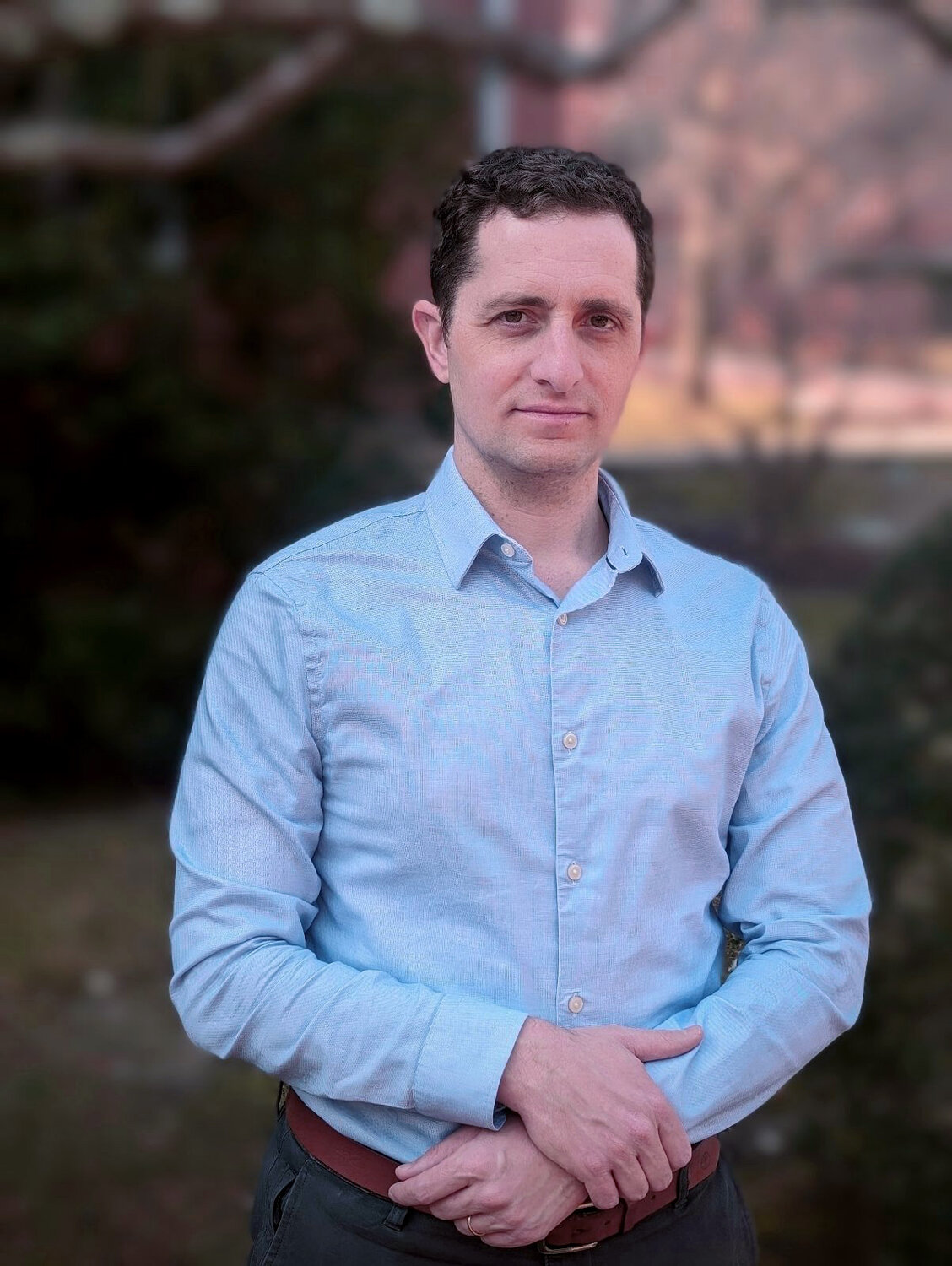PC’s popular new scholar-in-residence explores relationships between religions
Prof. Benny Bar-Lavi has only lived in Providence since last summer, but he is already a busy man. A course he co-taught at Providence College, “Jews and Christians in Dialogue,” was filled to capacity, as is his current offering, “Judaism as an Idea in Western Civilization.”
Bar-Lavi is Scholar-in-Residence in Jewish Studies and Jewish-Christian Relations at PC, and he is also teaching a course in Judaism and Christianity for Delve Deeper, the community initiative geared toward adult learners.
“The students here [at PC] are very curious,” says Bar-Lavi. “There’s a lot of civic responsibility. They’re hard-working and eager to learn. They’re very respectful of knowledge.”
Bar-Lavi and his wife, Ayala, arrived in Rhode Island with their two children, and a third was born in January. But he still finds time to work on his book, “Politics Against God: Judaism and Islam in the Political-Theological Discourses of Early Modernity.”
Bar-Lavi, 41, is also a sublime conversationalist, speaking softly, but firmly, and with a slight accent. He effortlessly holds forth on religion, history and ancient texts, but in a patient tone, as if his calendar is empty. Every sentence he speaks feels like an invitation to learn more.
Finding the common ground between Judaism and Christianity has been a running theme in Bar-Lavi’s life since his earliest years. He was born in Mexico City, and spent his first 14 years in Mexico’s enormous capital city. Bar-Lavi’s father was Israeli, and his mother Mexican; they met while both were studying at the Hebrew University of Jerusalem. The family spoke Hebrew at home, but just outside their door, a bustling world of Spanish Catholicism reigned.
“Mexico was profoundly Catholic,” Bar-Lavi remembers. “Catholicism fascinated me from the time I was a little kid.”
These interactions were mostly positive, he recalls.
“There was never violent antisemitism,” he says. “There may have been a ‘country club’ antisemitism, but there was never something [more hostile] in Mexico. There was a positive coexistence, a lot of civility.”
As a teenager, Bar-Lavi moved with his family to Israel. He already knew the language and had a strong sense of his father’s Israeli identity, so the transition went smoothly, even for an adolescent from another hemisphere.
“Israel was very easy,” he remembers. “It felt like home very immediately.”
When Bar-Lavi began his studies at Hebrew University, he was drawn to the history of religious and political thought, especially in the “early modern” period, which is loosely defined as Western intellectual development from the late Middle Ages through the Enlightenment.
He observed how often leaders in Jewish and Christian scholarship would exchange ideas. A classic example is the 13th-century friar, philosopher and theologian Thomas Aquinas, who based many of his writings on close readings of Jewish theologian Moses Maimonides.
“The big debates, many of them surfaced for the first time in early modernity,” Bar-Lavi says. “We sometimes tend to think of Judaism and Christianity as having a separate evolution, a parallel development. But both religions continued to profoundly influence each other. This is something that is still ongoing.”
He pauses, and then adds, “This is also true for Islam.”
While he is as fluent as a native Rhode Islander, Bar-Lavi did not grow up speaking English, and he didn’t study the language in earnest until he entered college. The richest scholarship, he found, was composed in English. This opened a very large door, and Bar-Lavi went on to pursue a Ph.D. at the University of Chicago.
The Theology Department at Providence College has never hosted a scholar-in-residence before, but Bar-Lavi has already made a strong impression at the start of his two-year appointment.
Last July, in anticipation of his arrival, PC hosted an online lecture called “An Assembly for the Sake of Heaven: The New Testament and the Providential Role of Christianity in the Thought of Rabbi Jacob Emden.” This presentation, sponsored by the Jewish-Catholic Theological Exchange, seemed to set the stage for Bar-Lavi’s work in Rhode Island.
“It seemed like a great fit,” Bar-Lavi says of his appointment, “taking into account my whole academic trajectory and interests.”
In conversation, Bar-Lavi politely evades questions about his own Jewish identity.
“I usually don’t mix the two,” he says. “Whatever I do as a teacher and scholar should stand on its own.”
The thrust of his work, and the reason his family moved to Rhode Island, is to facilitate inter-religious conversations. This includes the current Delve Deeper course, “Two Nations in Your Womb: Jews and Christians in Late Antiquity,” which he is co-teaching with PC Prof. Arthur Urbano.
“There are many ways of understanding a text,” he says.
While the majority of his students at PC had Catholic upbringings, Bar-Lavi appreciates how enthusiastically his students engage in theological cross-pollination.
“Increased dialogue has historically proven very fruitful. It’s not a zero-sum game. It can reinforce their devoutness,” he says.
The Bar-Lavis have settled comfortably in Providence, despite the lack of sleep brought on by a newborn. Bar-Lavi stops himself from disparaging big-city Chicago, but it is clear he prefers a more intimate environment.
“Providence has this small-town feeling, in the best possible way,” he says. “The city, the campus, the Jewish community. There’s been a lot of kindness.”
ROBERT ISENBERG is a freelance writer and multimedia producer based in Cranston. His latest book, “Mile Markers: Essays on Cycling,” will be released in April.








